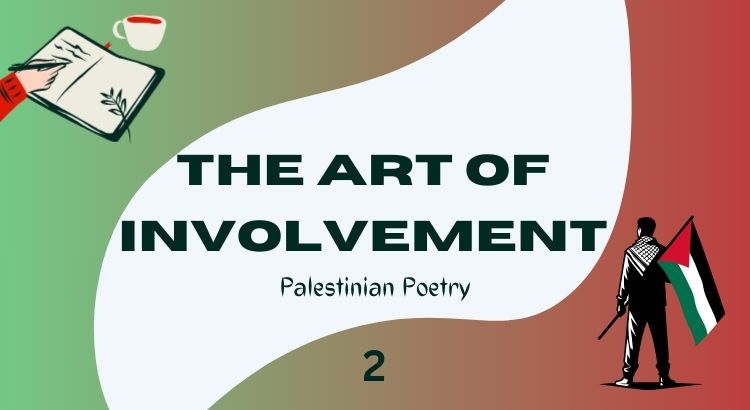
Using his poetry to advocate for Palestine is Yahya Ashour’s persistent mission as he tours from college to college across the United States. He grew up in the Gaza strip and has family there now. His pain and struggle is ever present, and he admits the darkness that completely overtook him following Israeli attacks following October 7th was crippling and is something he has to process everyday. This deep sadness that was at first paralyzing is now the force that drives him to continue traveling endlessly, sharing his art, and advocating for his people.
Ashour visited the University of Michigan-Dearborn in February. I remember sitting down in the auditorium as he set up, scanning the audience and passively noting how this was one of the first campus events that I saw such a diverse age range attending. Ashour gently spread a keffiyeh atop the podium. And then he read.
He had several poems to share, all with a clear, steady voice. He discussed dreams haunted by survivor’s guilt, life among rubble, and the abandonment of Palestinians in Gaza as neighboring nations looked on. Each poem was phenomenal in its craft, but the audience hesitated to applaud. How do you clap for someone’s suffering, laid out in front of you, eloquent as it may be?
Art is in many ways a way of breaking yourself open and giving your vulnerability to the world to digest. Sometimes, our appreciation of other’s skills in relaying their pain makes me feel rotten inside. I feel like I am intruding on the complex suffering of another human being. But from art, from expression, comes a greater understanding of the world and motivation to change it.
It also gives space to conversation. Through audience interaction, I met the man that housed Ashour and helped him through the lows of the months following the beginning of Israel’s brutal retaliation. I met Palestinian elders that expressed their pride for Ashour’s dedication and heart in speaking for their people.
One of the most key components of this conversation, however, was the critique Ashour laid out. Having spent extensive time in Michigan and some time in Dearborn specifically, Ashour delivered direct, relevant complaints to the audience about how he expected more origanization and action from Dearborn, known for being a heavily Arab American populated city. Ashour also spoke to the United States at large, to the masses of people going through the motions of life without a care for those being slaughtered with American money and arms.
Certainly, not everyone avoids despair over this genocide. Since November, I feel like I scroll through a terrifying display of war, bombing, death, mutilation, and starvation each day and shut down, unable to process the monstrous inhumanity. But I let myself be paralyzed by it too often, and end up doing nothing but engaging with them online or ranting about the genocide to friends.
When I thoughtlessly asked how one rose out of despair to take action, he responded, “I am not the person to ask. I am in despair… Perhaps you need to despair,” he commented, likely thinking of the many, many Americans that go through life with a shield of apathy and a cutting sword of unjustified helplessness.
There is a desperate need for active morals instead of default “neutrality”, which I feel more often than not describes ignorance that persists through a helplessness we grant ourselves, or else an avoidance of the pain that needs to be addressed. We think that reposting on social media infographics and Palestinian art is enough to assuage our moral failings, but this is supplementary at best. We think that we are only responsible for ourselves, that our morality is self contained, while our elected leadership continues to make decisions that cause death after death.
It is all too easy to despair, but Ashour tries to call us into action and not just well meaning empty promises. We have more agency and power than we know, particularly when we organize. We need strategy, which is what those who implement oppression excel at.
Now I see college encampments across the globe and I am proud. I see how they engage art through poetry readings and posters in a way that has much more meaning in person, in community. They are acting on the art as opposed to just consuming it, which reflects Ashour’s belief of art being a motivating core of the Free Palestine Movement. I know these actions have brought Palestinians and Ashour some hope. There is still much to do. I pray that more come forward and continue in allyship to liberate others, maintaining the lessons learned in organizing and effecting real change.
So as we engage with art in all of its thematic and political allure, we must remember that it is more than just entertainment. Poetry has been a lifeline for me, and in it I find humanity inseparable to a call to action. In suffering, I find the urge to soothe suffering. In joy, I find the desire to create and protect that joy for others. Art is survival. May we continue to create and recite and share and act until we are all free.
Buy an ebook of Yahya Ashour’s poetry here. Proceeds go to helping his family get out of Gaza.
@yahyaashour98
Follow Yahya Ashour to learn more about his work and how you can help Palestinians


